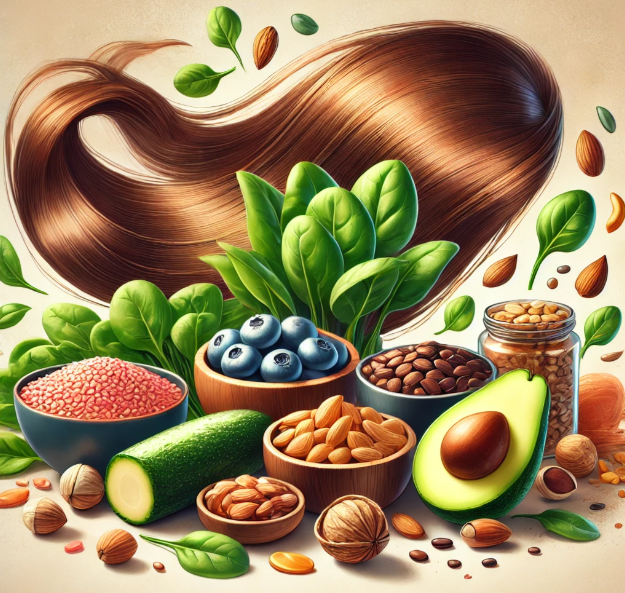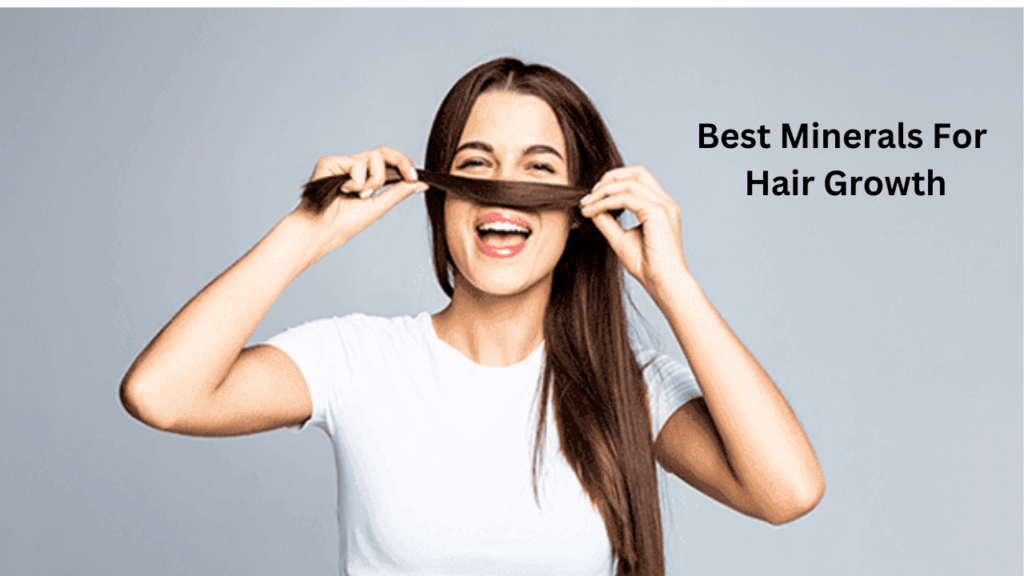Hair growth is a complex process influenced by various factors, including genetics, hormones, and nutrient intake.
Each hair strand undergoes a growth cycle consisting of three phases: anagen (growth phase), catagen (transition phase), and telogen (resting phase).
Adequate nutrition, including essential minerals, supports this cycle and promotes hair growth.
Let us discuss the best minerals for hair growth and how they contribute to keeping your hair looking its best.
Role Of Minerals in Hair Health
They are essential building blocks contributing to the structure, strength, and overall health of the hair follicles and scalp.
- Support Follicle Strength
- Prevent Anemia-Related Hair Loss
- Regulate Calcium Levels
- Promote Scalp Health
- Support New Hair Growth
- Prevent Premature Graying
- Strengthen Hair Structure
- Support Hair Cell Function
- Balance Hormones
- Thicken Hair
- Improve Shine
- Support Hormonal Balance
- Strengthen Hair Shafts
Best Minerals for Hair Growth

The right nutrition plays a significant role in maintaining luscious, healthy, and strong hair.
1. Iron: The Oxygen Carrier
It helps red blood cells carry oxygen to cells throughout the body, including hair follicles.
When hair follicles don’t get enough oxygen, they can weaken, leading to shedding and slow hair growth.
The Role of Iron in Hair Growth
- Enhances Circulation: Iron promotes blood flow, ensuring hair follicles receive the nutrients and oxygen they need to grow.
- Prevents Hair Loss: Low iron levels can lead to anemia, a condition linked to hair loss and thinning.
Food Sources of Iron
- Red Meat: Beef and lamb are rich sources of heme iron, which is more easily absorbed by the body.
- Leafy Greens: Spinach and kale offer non-heme iron, which can be better absorbed with vitamin C.
- Legumes and Tofu: For plant-based people, lentils, chickpeas, and tofu are great alternatives.
2. Zinc: The Strengthening Mineral
Zinc is an essential mineral that plays a significant role in hair tissue growth and repair.
It helps keep the oil glands around the hair follicles functioning properly, which is vital for maintaining a healthy scalp.
How Zinc Helps with Hair Growth
- Regulates Hormones: Zinc helps balance hormones, which is crucial since hormonal imbalances can lead to hair loss.
- Promotes Repair and Growth: It aids in DNA and RNA production, essential for proper hair follicle function and growth.
- Protects Against Dandruff: Zinc has anti-inflammatory properties that help combat dandruff and keep the scalp healthy.
Sources of Zinc
- Meat: Beef, pork, and lamb
- Shellfish: Oysters, crab, and shrimp
- Legumes: Lentils, chickpeas, and beans
- Seeds: Pumpkin and sesame seeds
3. Iodine: The Thyroid Regulator
Iodine is essential for thyroid function, which directly influences hair growth. The thyroid gland controls the release of hormones that impact hair follicle health and development.
An iodine deficiency can lead to hypothyroidism, a condition often associated with hair thinning and shedding.
How Iodine Benefits Hair Growth
- Maintains Healthy Hormones: Iodine ensures the thyroid gland produces enough hormones to support healthy hair growth.
- Supports Follicle Development: Proper iodine levels help maintain active hair follicles.
Sources of Iodine
- Seaweed: Kelp and nori are especially rich in iodine.
- Dairy Products: Milk, cheese, and yogurt.
- Iodized Salt: An easy way to incorporate iodine into your diet.
4. Calcium: The Growth Enhancer
Calcium isn’t just essential for bone health; it’s also crucial for hair growth. It plays a role in cell communication, ensuring hair follicles receive the signals needed to grow and thrive.
The Role of Calcium in Hair Growth
- Boosts Cell Communication: Calcium aids the signal transformation between cells, promoting hair follicle function.
- Supports Hormonal Balance: It helps regulate certain hormones, that are key to healthy hair growth.
Best Sources of Calcium
- Dairy Products: Milk, cheese, and yogurt.
- Fortified Plant Milk: Almond and soy milk.
- Leafy Greens: Kale and collard greens.
5. Sulfer: the beauty mineral
Sulfur is often called the “beauty mineral” for its role in producing keratin, the protein that makes up hair.
It is also involved in collagen production, which helps keep hair strong and elastic.
Benefits of Sulfur for Hair
- Strengthens Hair: Boosting keratin synthesis, sulfur helps make hair more resilient and less prone to breakage.
- Promotes Growth: A healthy level of sulfur in the body supports faster hair growth.
Natural Sources of Sulfur
- Eggs: A top source of sulfur-rich protein SD
- Onions and Garlic: Known for their high sulfur content.
- Cruciferous Vegetables: Broccoli, cauliflower, and cabbage
6. Copper: The Pigmentation Mineral
Copper plays a crucial role in maintaining hair pigmentation and preventing premature graying. This mineral is involved in melanin production, the pigment responsible for hair color.
Additionally, copper helps maintain collagen and elastin, which contribute to a healthy scalp and hair follicles.
Benefits of Copper for Hair
- Prevents Premature Graying: Adequate copper levels help maintain natural hair color.
- Strengthens Hair Follicles: Copper aids in the production of cross-links in collagen and elastin fibers, promoting stronger hair.
Foods Rich in Copper
- Shellfish: Lobster, oysters, and crab.
- Nuts and Seeds: Sunflower seeds and cashews.
- Dark Chocolate: A delicious way to boost copper intake.
7. Silicon: The Hair-Strengthening Mineral
Silicon, often found as silica, is a mineral that helps strengthen hair strands and improve hair elasticity.
It is also involved in collagen synthesis, which supports hair growth and scalp health. Silica deficiencies can result in brittle hair that is prone to breakage.
The Role of Silicon in Hair Growth
- Improves Hair Thickness: Regular silicon intake can make hair appear thicker and fuller.
- Enhances Shine: Silicon helps the hair retain water, adding moisture and making hair shinier.
Best Food Sources of Silicon
- Bananas: A convenient source of dietary silicon.
- Whole Grains: Barley, brown rice, and oats.
- Vegetables: Asparagus and leafy greens.
8. Magnesium: The De-Stressing Mineral
Magnesium is often overlooked but is vital for preventing hair loss and promoting healthy hair growth. It helps the body manage stress by supporting the adrenal glands and regulating stress hormones.
Chronic stress can lead to increased hair loss, so maintaining sufficient magnesium levels can prevent this.
How Magnesium Contributes to Hair Health
- Prevents Calcium Buildup: Magnesium ensures that calcium is properly utilized by the body, preventing calcium deposits that can clog hair follicles and inhibit growth.
- Reduces Inflammation: It has anti-inflammatory properties that can reduce scalp inflammation, promoting a healthier environment for hair growth.
Food Sources Rich in Magnesium
- Nuts and Seeds: Almonds, pumpkin seeds, and flaxseeds.
- Leafy Greens: Spinach, Swiss chard, and collard greens.
- Whole Grains: Brown rice, oats, and quinoa.
9. Selenium: The Antioxidant Mineral
Selenium is a trace mineral with powerful antioxidant properties. It helps the body produce selenoproteins, enzymes that regulate inflammation and contribute to hair follicle development.
Selenium protects hair follicles from damage caused by environmental stressors like UV rays and pollution.
Benefits of Selenium for Hair Growth
- Promotes New Hair Growth: Selenium helps in initiating new hair growth cycles and prevents hair loss by maintaining a healthy scalp.
- Regulates Hormones: This mineral assists in regulating thyroid hormones, which can influence hair growth patterns.
Rich Sources of Selenium
- Brazil Nuts: One of the highest natural sources of selenium. Just one or two nuts a day can meet your daily requirements.
- Seafood: Tuna, salmon, and sardines are excellent sources.
- Whole Grains: Brown rice and barley also provide selenium.
Signs of Mineral Deficiency In Hair Health
Being aware of deficiency symptoms can help you address potential gaps in your nutrition before they impact your hair:
- Zinc deficiency: Thinning hair, scalp dryness.
- Iron deficiency: Noticeable shedding, pale skin.
- Selenium deficiency: Dry scalp, brittle hair.
- Magnesium deficiency: Hair loss due to stress, and muscle cramps.
- Iodine deficiency: Thinning hair, sluggishness.
Tips To Maximize Mineral Absorption
To maximize the benefits of these minerals, it’s essential to ensure proper absorption. Here are some tips to help your body make the most of these nutrients:
- Pair with Vitamin C: For minerals like iron and zinc, pair them with foods rich in vitamin C, such as citrus fruits or bell peppers, to enhance absorption.
- Maintain a Balanced Diet: A well-rounded diet that includes proteins, healthy fats, and carbohydrates can improve overall mineral absorption.
- Stay Hydrated: Proper hydration helps transport nutrients throughout the body.
From zinc and iron to magnesium and copper, each mineral plays a vital role in promoting growth, preventing hair loss, and maintaining shine and elasticity. By understanding their benefits and ensuring you consume foods rich in these nutrients, you’re on your way to stronger, healthier, and more.



